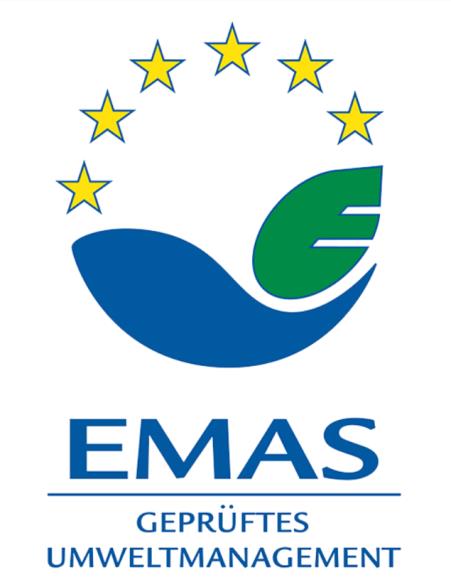HOLISTIC SUSTAINABILITY
AWARDS
We care about sustainability in our company and brands, and we develop solutions that will protect the environment and precious resources. This includes product development and production with energy-efficient technology and renewable energy while cutting emissions to a minimum, focusing on sustainable raw materials and packaging, and using recycled materials in packaging and products
EMAS (Eco-Management and Audit Scheme) is the quality mark of the EU. EMAS covers all DIN EN ISO 14001 requirements, thus ensuring a product’s legal compliance and transparency with regard to environmental areas from energy consumption to waste and emissions. EMAS is the most demanding and thorough environmental management system on the market. BNS Mainz was awarded EMAS certification in 2019, followed by the Polish facility in Jaworzno in 2022. > www.emas.de

The bluesign®system is a holistic full-service solution focused on sustainable chemistry. Das bluesign®spans the entire textile value chain towards reducing social and ecological impact. Certification requirements can go beyond legal requirements. bluesign® is the most important certification in the textile industry. Seit 2022 We were awarded bluesign® certification in 2022 > www.bluesign.com



PLASTICS – MORE SUSTAINABLE THAN YOU MIGHT THINK
Plastic is an extremely durable material. Plastic is light, stable, and versatile; it has so many uses that we couldn’t do without it in the modern world. On the other hand, our planet is suffocating from all the packaging waste from industrial societies – on land and at sea. Plastic waste is an especially serious environmental pollutant that gradually disintegrates into smaller and smaller pieces known as microplastics. It really doesn’t have to be this way.
Just like paper, glass, and metal, much of our everyday plastics can be recycled and reused as a valuable raw material, which we refer to as recyclates. . Post-consumer recyclates (PCRs) can be used to make new packaging. Recyclable plastics are sourced from municipal recycling collection such as the “yellow bin” scheme in Germany. This has become part of the circular economy with waste plastics recycled to a high level of quality any number of times.
Many of our bottles are already made of 100% recycled plastic, with numbers constantly rising. We aim to have all our plastic packaging made from this sustainable material by the year 2025.
RENEWABLE RAW MATERIALS
Surfactants are the active agents used in cleaning products. You will mostly find surfactants in detergents as they are effective at dissolving dirt, grease, and other substances that won’t dissolve in water. Most detergents contain surfactants made from mineral or tropical oils.
Our aim is to replace conventional surfactants with surfactants from renewable European plant oils over the next few years.
Products such as our Solitaire Eco Care cleaning foam with olive-based
surfactants have already taken a pioneering position on the market. Our Solitaire Bionic Protector takes it one step further with chitosan acting on the bionic principle. This involves collecting shells from shrimp from the food industry and using them in a raw material in sustainable high-performance waterproofing products instead of discarding them as a waste product.


Our natural Bergal beechwood shoetrees and adjustable lasts are made using wood harvested from thinning out sustainably managed beech forests in Germany. Most forests require regular maintenance to preserve and improve timber quality and yield. We keep shipping routes short such that production and final assembly only take place within Germany; these specialist items are therefore entirely made in Germany.
We also use sustainable and regenerative raw materials for our insoles and footbeds wherever we can – surface layers in cotton or bamboo, intermediate layers in natural latex, base layers in robust coconut fibre, all bonded together using
vegan adhesives.
OTHER MATERIALS
We have worked closely with leading chemicals companies on developing and implementing completely new production processes towards creating the first solvent-free shoe polishes to reach the market. These production processes were, and still are, unique to our industry in reducing environmental impact; all the parameters involved have been taken as a whole from the outset instead of shifting problems from one place into another.
Does it always have to be spray-on waterproofing? There is another way. We’ve been setting standards in sustainability and consumer friendliness since the early 1990s with waterproofing concentrate to dab on or spray on mist-free.
Our other product areas also feature a high degree of innovation and constant improvement in product sustainability. Just a few examples: We were the first insole manufacturer to switch to environmentally friendly cardboard packaging in the Bergal brand in 1993, completely eliminating around 450 tonnes of plastic.


Most metal shoehorns on the market are made of unalloyed steel galvanised with a copper and nickel coating to prevent corrosion, a process that consumes unnecessary amounts of electricity, water, and chemicals.
In contrast, the stainless steel we use in our Comfort Concept metal shoehorns is long-lasting and recyclable, making it highly sustainable as a raw material. Stainless steel disposed of properly can be melted down and reused any number of times without any loss in quality. Our metal Comfort Concept shoehorns are made of at least 50% sustainable stainless steel.
